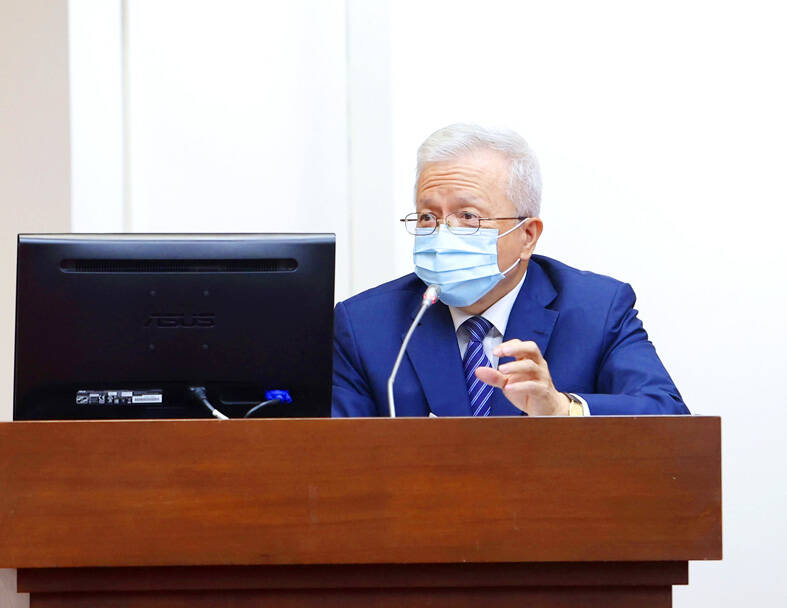The central bank is to focus on inflation in an upcoming quarterly policy meeting, as the public has been affected by rising prices, bank Deputy Governor Yen Tzung-ta (嚴宗大) said at a meeting of the legislature’s Finance Committee in Taipei yesterday.
Yen said the bank considers three factors — economic growth, financial stabilization and inflation — when it adjusts its monetary policy.
Inflation has weighed more in the central bank’s consideration, as the consumer price index (CPI) has risen by more than 2 percent — an alert level set by the central bank — for 19 months in a row, Yen said.

Photo: CNA
Such a long period of high growth in the CPI has boosted public expectation that it is likely to continue to rise, Yen said.
Taiwan’s CPI rose by 2.74 percent over the first two months of this year compared with the same period last year, and by 2.43 percent last month alone, the Directorate-General of Budget, Accounting and Statistics (DGBAS) said.
Inflation could rise further, as the government decided last week to raise electricity rates by an average of 11 percent starting on Saturday next week.
The power tariff hike is expected to result in an increase of 0.204 percentage points to the CPI, the DGBAS said.
The central bank has scheduled its next quarterly policy meeting for Thursday.
Market analysts have said the central bank might leave key interest rates unchanged to boost the economy at a time when Taiwan’s exports have been affected by weakening global demand.
Taiwan’s outbound shipments last month fell 17.1 percent year-on-year to US$31.05 billion, marking the sixth consecutive month of annual decline.
The central bank since March last year has raised rates by 62.5 basis points in an effort to combat inflation.
In the last policy meeting held in December last year, the central bank estimated the nation’s GDP would grow 2.53 percent this year by taking into account Taiwan’s weaker export performance.
Yen said the central bank would announce an update of its forecast after Thursday’s meeting.
Responding to the recent failures of Silicon Valley Bank and Signature Bank in the US, Yen said the US Federal Reserve might slow its pace of hikes in the current rate hike cycle, which is likely to stabilize global financial markets.
The Fed is to begin a two-day policy meeting starting today.

UNCERTAINTY: Innolux activated a stringent supply chain management mechanism, as it did during the COVID-19 pandemic, to ensure optimal inventory levels for customers Flat-panel display makers AUO Corp (友達) and Innolux Corp (群創) yesterday said that about 12 to 20 percent of their display business is at risk of potential US tariffs and that they would relocate production or shipment destinations to mitigate the levies’ effects. US tariffs would have a direct impact of US$200 million on AUO’s revenue, company chairman Paul Peng (彭雙浪) told reporters on the sidelines of the Touch Taiwan trade show in Taipei yesterday. That would make up about 12 percent of the company’s overall revenue. To cope with the tariff uncertainty, AUO plans to allocate its production to manufacturing facilities in

Taiwan will prioritize the development of silicon photonics by taking advantage of its strength in the semiconductor industry to build another shield to protect the local economy, National Development Council (NDC) Minister Paul Liu (劉鏡清) said yesterday. Speaking at a meeting of the legislature’s Economics Committee, Liu said Taiwan already has the artificial intelligence (AI) industry as a shield, after the semiconductor industry, to safeguard the country, and is looking at new unique fields to build more economic shields. While Taiwan will further strengthen its existing shields, over the longer term, the country is determined to focus on such potential segments as

TAKING STOCK: A Taiwanese cookware firm in Vietnam urged customers to assess inventory or place orders early so shipments can reach the US while tariffs are paused Taiwanese businesses in Vietnam are exploring alternatives after the White House imposed a 46 percent import duty on Vietnamese goods, following US President Donald Trump’s announcement of “reciprocal” tariffs on the US’ trading partners. Lo Shih-liang (羅世良), chairman of Brico Industry Co (裕茂工業), a Taiwanese company that manufactures cast iron cookware and stove components in Vietnam, said that more than 40 percent of his business was tied to the US market, describing the constant US policy shifts as an emotional roller coaster. “I work during the day and stay up all night watching the news. I’ve been following US news until 3am

COLLABORATION: Given Taiwan’s key position in global supply chains, the US firm is discussing strategies with local partners and clients to deal with global uncertainties Advanced Micro Devices Inc (AMD) yesterday said it is meeting with local ecosystem partners, including Taiwan Semiconductor Manufacturing Co (TSMC, 台積電), to discuss strategies, including long-term manufacturing, to navigate uncertainties such as US tariffs, as Taiwan occupies an important position in global supply chains. AMD chief executive officer Lisa Su (蘇姿丰) told reporters that Taiwan is an important part of the chip designer’s ecosystem and she is discussing with partners and customers in Taiwan to forge strong collaborations on different areas during this critical period. AMD has just become the first artificial-intelligence (AI) server chip customer of TSMC to utilize its advanced